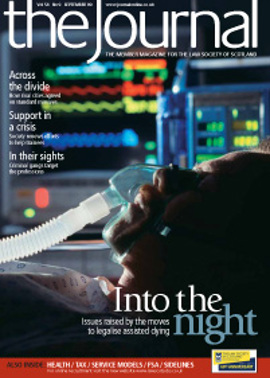Curators: the vital link

For over 40 years, the Scottish system of children’s hearings, with its focus on care and support, rather than criticism and punishment, has been admired around the world. One of its great strengths has always been the separation between fact finding (a function that can only be undertaken by a court) and disposal (something that is best delivered by members of the child’s community in an informal, inclusive setting).
The process starts with the grounds of referral, a document which forms the cornerstone of all subsequent involvement by the hearing and support agencies. Precision in the grounds is crucial: the hearing can hardly set about fixing a problem if it doesn’t properly understand what the problem is. Grounds that say too much or say too little can cause untold harm.
That’s why the referral proof (the court process that decides whether grounds are established, and if so on what basis) is so important. An accurate outcome is not a foregone conclusion. Vulnerable parents, some with addiction or mental health problems, often find it difficult to participate. Social work investigations may not get to the heart of the difficulties, whether through a lack of trust, lack of resources, or both. The affected children may be reluctant to say what’s going on, because of loyalties to their parents, mistrust of strangers, or immaturity. Take the child who is referred for truancy, where no-one realises the true reason is the step-dad’s drinking. Or the child who suffers an unexplained injury while living with a drug addicted mother, and who won’t reveal that the injury was accidental, out of a misguided fear that the mother will get into trouble: the hearing then deals with the case as assault, rather than helping the mother overcome her problem. Get it right for a child, and the system is rightly the envy of the world; get it wrong, and an already vulnerable family is put at great risk.
When the system was set up, Parliament offered courts and hearings the option of appointing a lay safeguarder to look after the interests of children. From an early stage, however, sheriffs across Scotland have decided that the interests of children are better served by appointing legally qualified curators to act for children in referral proofs.
Safeguarding a child’s interests at a children’s hearing is an entirely different role from that of safeguarding a child’s interests in a proof. At a hearing, the community, in the form of panel members, social workers, teachers, and the family, sits around a table and works out what is best for a child. A court, however, has to determine facts on the basis of evidence. The process involves testing witnesses through cross examination, considering issues of reliability and credibility, and determining what evidence is relevant and what is not. A lay safeguarder cannot meaningfully participate in that process. They can’t realistically cross examine witnesses, or object to evidence. A curator, on the other hand, will investigate the case fully, examine witnesses where necessary, and powerfully represent the child’s interests. For many years sheriffs have appointed curators for just this reason.
Curators are hand picked for their particular expertise in children’s referral cases. In Glasgow, curators are members of an association that provides training and peer review. Curators regularly speak to a range of professionals, such as child psychologists, about issues which can arise. As a result, the appointment of a curator gives the best possible prospect of the child’s views being meaningfully taken into account, and the court arriving at the right decision.
In light of this, the Government’s proposal in its draft bill to prohibit sheriffs from appointing curators represents a dangerous step backwards for our highly regarded system. It’s notable that the proposal wasn’t in the Government’s original consultation – it seems to have been proposed to them by the Scottish Legal Aid Board as a money-saving option.
In this issue
- Internet use in the workplace: a digital dilemma?
- Mental Welfare Commission for Scotland under threat
- Tricky choice over Liechtenstein assets
- Cost and benefit
- Curators: the vital link
- Solicitor advocates: the future (part 2)
- Trainee recruitment: dialogue continues
- What sort of life?
- Registers page
- Foot on the ladder
- Recovery vehicle
- Your say
- Lawyers in their sights
- West Bank: a response
- Fairness guide to success
- Facebook debate pulls them in
- Law reform update
- Ahead of the game
- Ask Ash
- A club you don't want to join
- Stress busters
- Into the ether we go!
- Breaking up is hard to do
- Definitive view
- Right that doesn't pale
- Mutu point
- Once bitten, twice shy
- Scottish Solicitors' Discipline Tribunal
- Website review
- Book reviews
- FSA starts to fight back
- For a good clause






